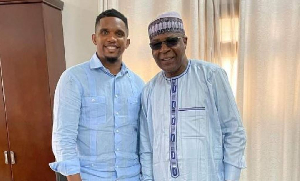A Jurist and Consultant, Rodrigue Mboda, has stated that for the Cameroonian justice system to become independent as prescribed by the principle of separation of power, the Higher Judicial Council with President Paul Biya as Chairman should be dislodged from the Presidency of the Republic and relocated elsewhere.
Mboda made the statement in Yaounde on March 31, while presenting a report on the state of justice system in Cameroon for the 2014 judicial year. The occasion was the 2015 Justice Forum Day organised by the Centre for the Promotion of Law, known by its French acronym as CEPROD. The theme of the day was: “Independence of the Justice System in Cameroon: the State of Affairs.”
Welcoming participants, the Executive Director of CEPROD, Michel Manfouo, disclosed that the event was part of an ongoing project dubbed: “The Observatory of Justice in Cameroon,” which CEPROD engaged since February 2014 with the support of the Washington, USA-based National Endowment for Democracy, NED.
He described the Justice Forum Day as one of the key activities of the project that fosters discussion between social partners on the quality of justice in Cameroon with the aim of improving its performance.
In presenting the 2014 judicial report, Mboda said the efficacious nature of the justice system is at the centre of all democratic theories and the rule of law, even though he regretted that in Cameroon, the issue is a permanent pre-occupation. He highlighted the general context of the report; objectives and interest of the study; methodology used and brought out a number of observations.
He stated that, following the principle of separation of power as one of the tenets of democracy, justice is, in principle, free and void of all interferences from the executive arm.
“But in Cameroon, as a result of clientelism in the management of power, there is no doubt that the judiciary pays allegiance to the executive power.
Consequently, the management of the career of Magistrates by the Higher Judicial Council, presided at by the President of the Republic, weakens the independence of the judiciary,” Mboda stated, as he proposed solutions to move away from such dependency.
According to him, the designation of members of the Council does not take into account the different political composition of Parliament. He said the text obliges that personalities designated by the National Assembly and the Senate should be of different political opinions as a way of guaranteeing equilibrium and independence.
Mboda also envisaged the limitation of the mandate of members of the Higher Judicial Council to that of the President of the Republic. He observed, for example, that members of Parliament, who are voted into office for a period of five years and designated members of the Council, will continue to keep their membership after their mandates of five years have expired. Such persons may no longer qualify to be members, if the electorate votes them out of office.
One of the shortcomings identified by the Jurist, which results in dependency on the executive by the judiciary, is the irregular nature of the Council’s sessions as the institution doesn’t function in a permanent manner.
“The Council meets at the Presidency of the Republic when summoned by the President to discuss on a specific agenda. The law doesn’t indicate the periodicity of the meetings; meanwhile, it is during these sessions that Magistrates are posted. This causes prejudice to the normal administration of justice.”
Mboda talked of two batches of Magistrates, who graduated from the National School of Administration and Magistracy, ENAM, who had completed their training long ago, but could not be posted until recently, because the Council meets at the whims and caprices of its Chairperson who is the President of the Republic and of the executive arm of Government. He remarked that the need for judicial personnel was felt at all levels and this is contributing to the snail pace of handling Court cases.
The Jurist and Consultant said, above all, “The seat of the Higher Judicial Council is lodged at the Presidency of the Republic, denoting increasing dependency of the judiciary vis-à-vis the executive power.”
According to Mboda, that institution needs to be dislodged from the Presidency for it to be more independent. He added that, for the fact that it is the Council that serves as a regulatory institution for the careers of Magistrates expected to dispense justice with independence and impartiality doesn’t guarantee that independence, thus, hampering the birth of a State of law in Cameroon.
Mboda rhetorically questioned whether it is not time for the Cameroonian justice system to follow the French constitutional reform of July 23, 2008, where justice seekers are given the opportunity to table complaints directly to the Higher Judicial Council on the behaviour and discipline of Magistrates observed during Court cases.
He observed that justice seekers sometimes suffer, not only because of their ignorance of the law protecting them, but also because some Magistrates are rather defending the judico-political system in place, instead of protecting the rights and liberties of individuals.
Actualités of Friday, 10 April 2015
Source: The Post Newspaper













